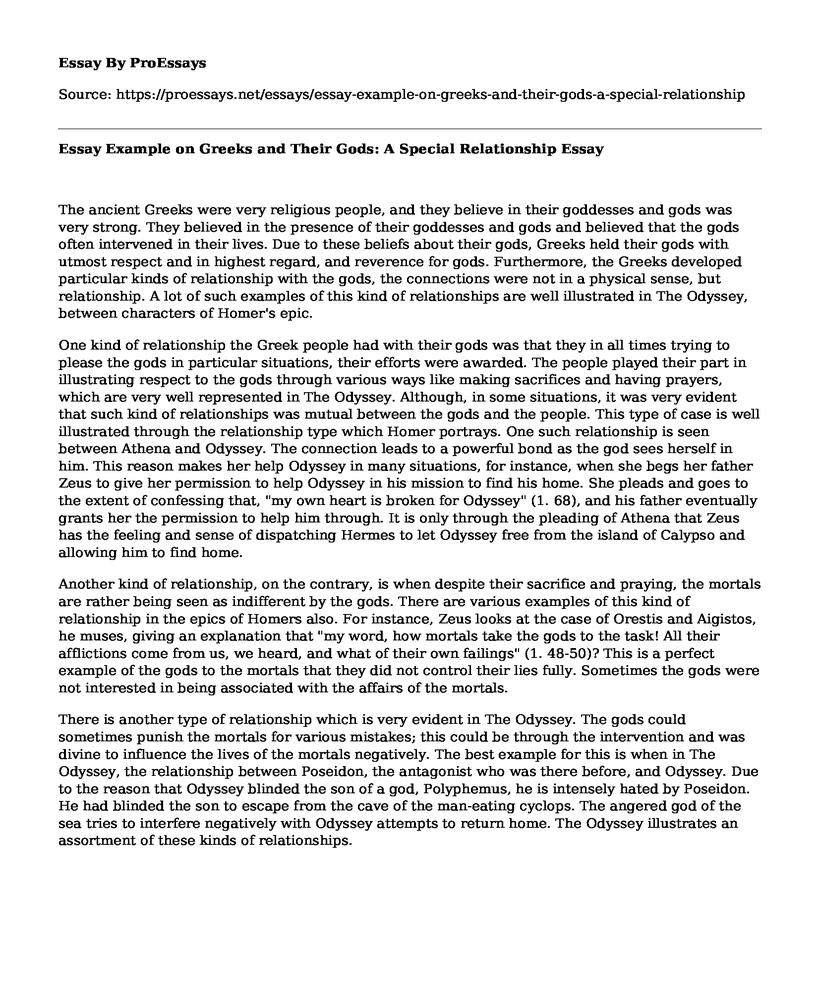The ancient Greeks were very religious people, and they believe in their goddesses and gods was very strong. They believed in the presence of their goddesses and gods and believed that the gods often intervened in their lives. Due to these beliefs about their gods, Greeks held their gods with utmost respect and in highest regard, and reverence for gods. Furthermore, the Greeks developed particular kinds of relationship with the gods, the connections were not in a physical sense, but relationship. A lot of such examples of this kind of relationships are well illustrated in The Odyssey, between characters of Homer's epic.
One kind of relationship the Greek people had with their gods was that they in all times trying to please the gods in particular situations, their efforts were awarded. The people played their part in illustrating respect to the gods through various ways like making sacrifices and having prayers, which are very well represented in The Odyssey. Although, in some situations, it was very evident that such kind of relationships was mutual between the gods and the people. This type of case is well illustrated through the relationship type which Homer portrays. One such relationship is seen between Athena and Odyssey. The connection leads to a powerful bond as the god sees herself in him. This reason makes her help Odyssey in many situations, for instance, when she begs her father Zeus to give her permission to help Odyssey in his mission to find his home. She pleads and goes to the extent of confessing that, "my own heart is broken for Odyssey" (1. 68), and his father eventually grants her the permission to help him through. It is only through the pleading of Athena that Zeus has the feeling and sense of dispatching Hermes to let Odyssey free from the island of Calypso and allowing him to find home.
Another kind of relationship, on the contrary, is when despite their sacrifice and praying, the mortals are rather being seen as indifferent by the gods. There are various examples of this kind of relationship in the epics of Homers also. For instance, Zeus looks at the case of Orestis and Aigistos, he muses, giving an explanation that "my word, how mortals take the gods to the task! All their afflictions come from us, we heard, and what of their own failings" (1. 48-50)? This is a perfect example of the gods to the mortals that they did not control their lies fully. Sometimes the gods were not interested in being associated with the affairs of the mortals.
There is another type of relationship which is very evident in The Odyssey. The gods could sometimes punish the mortals for various mistakes; this could be through the intervention and was divine to influence the lives of the mortals negatively. The best example for this is when in The Odyssey, the relationship between Poseidon, the antagonist who was there before, and Odyssey. Due to the reason that Odyssey blinded the son of a god, Polyphemus, he is intensely hated by Poseidon. He had blinded the son to escape from the cave of the man-eating cyclops. The angered god of the sea tries to interfere negatively with Odyssey attempts to return home. The Odyssey illustrates an assortment of these kinds of relationships.
Cite this page
Essay Example on Greeks and Their Gods: A Special Relationship. (2023, Feb 23). Retrieved from https://proessays.net/essays/essay-example-on-greeks-and-their-gods-a-special-relationship
If you are the original author of this essay and no longer wish to have it published on the ProEssays website, please click below to request its removal:
- Howard Zinn's Contribution to the History Essay
- Metaphors and Scripts in Organizational Theory Paper Example
- Paper Example on Effective Interpersonal Communication
- Essay on 12 Years a Slave: Cultural Relativism and Norms in 19th Century Culture
- Essay Example on Native American Historical Trauma: Evidence-Based Practice Prospects
- Witnessing the American Civil Rights Movement: A Journey of Liberation & Equality - Essay Sample
- Paper Sample on Minor's Meningitis: Parental Consent vs Professional Duty Dilemma







